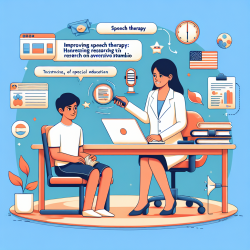In the field of speech therapy, understanding the effects of aversive stimuli on speech can significantly enhance the efficacy of therapeutic interventions. The research article titled "The effects of aversive stimuli on speech" by Dr. James R. McDearmon and Dr. Robert E. Potter provides valuable insights into how aversive stimuli influence speech development, production, and disorders. This blog aims to help practitioners improve their skills by implementing the outcomes of this research or encouraging further exploration.
Aversive stimuli, such as stress, penalty, and negative evaluation, have long been recognized as significant factors in the development and maintenance of speech disorders. The research emphasizes four key processes in reducing the maladaptive effects of aversive stimuli: habituation, extinction, punishment-training, and counter-conditioning. Understanding and applying these processes can lead to more effective speech therapy interventions.
Key Processes in Reducing Maladaptive Effects
- Habituation: This process involves the reduction of an unlearned response with repeated exposure to the aversive stimulus. Gradual exposure to the stimulus at low intensity can help clients adapt and reduce their negative reactions.
- Extinction: Extinction refers to the decrease in response strength when the aversive stimulus is no longer reinforced. This process can be applied in speech therapy by gradually increasing exposure to the aversive stimulus, thereby reducing anxiety and other negative emotions associated with it.
- Punishment-Training: This involves both positive reinforcement and an aversive stimulus being contingent upon a response. Gradually increasing the intensity of the aversive stimulus can train clients to respond in the presence of aversive emotions, thereby reducing the suppressive effects of punishment.
- Counter-Conditioning: Also known as systematic desensitization, this process involves evoking strong positive, anxiety-inhibiting responses in the presence of anxiety-arousing stimuli. Techniques such as relaxation and visualization can help clients manage their anxiety and improve their speech.
Practical Applications for Practitioners
Speech therapists can implement these processes in their practice to improve outcomes for their clients. Here are some practical applications:
- Gradually expose clients to aversive stimuli at low intensity to help them adapt and reduce negative reactions.
- Use extinction techniques by gradually increasing exposure to aversive stimuli, thereby reducing anxiety and other negative emotions.
- Incorporate punishment-training by providing positive reinforcement along with gradually increasing aversive stimuli to help clients respond in the presence of aversive emotions.
- Apply counter-conditioning techniques such as relaxation and visualization to help clients manage their anxiety and improve their speech.
Encouraging Further Research
While the research by Dr. McDearmon and Dr. Potter provides valuable insights, it is essential for practitioners to continue exploring and staying updated with the latest findings in the field. Attending conferences, participating in webinars, and reading relevant publications can help practitioners stay informed and implement the most effective techniques in their practice.
To read the original research paper, please follow this link: The effects of aversive stimuli on speech.










